
Intelligent Medicine
Scope & Guideline
Revolutionizing healthcare outcomes with intelligent solutions.
Introduction
Aims and Scopes
- Artificial Intelligence in Medical Imaging:
The journal extensively covers the application of AI techniques such as machine learning and deep learning in analyzing medical images, facilitating accurate diagnostics and treatment planning. - Clinical Decision Support Systems:
Research on systems that leverage AI to aid healthcare professionals in making informed decisions based on patient data and predictive analytics is a core focus area. - Predictive Modeling and Risk Assessment:
The journal publishes studies that develop predictive models for various health conditions, utilizing patient data to assess risks and outcomes effectively. - Telemedicine and Digital Health Technologies:
Emerging trends in telemedicine, particularly the integration of AI to enhance remote patient monitoring and care, are prominent in the journal's scope. - Interdisciplinary Approaches to Healthcare Challenges:
The journal encourages interdisciplinary research that combines insights from computer science, data analytics, and clinical practices to address complex health issues.
Trending and Emerging
- Advanced Machine Learning Techniques:
There is a growing emphasis on sophisticated machine learning methodologies, particularly in areas like image classification and predictive modeling for various diseases. - Integration of Big Data in Healthcare:
The use of big data analytics is increasingly prominent, with research focusing on harnessing large datasets to improve patient outcomes and healthcare delivery. - Ethical Considerations in AI Applications:
A rising interest in the ethical implications of AI in medicine is evident, highlighting the need for responsible use of technology in clinical settings. - Personalized Medicine through AI:
The trend towards personalized healthcare solutions powered by AI algorithms is gaining traction, emphasizing tailored treatment plans based on individual patient data. - Telehealth Innovations:
With the expansion of telemedicine, there is a notable increase in studies exploring AI's role in enhancing remote healthcare delivery and patient engagement.
Declining or Waning
- Traditional Diagnostic Methods:
There is a noticeable decline in publications focusing solely on traditional diagnostic methods without the integration of AI or advanced computational techniques. - General Reviews without Novel Insights:
The journal has shifted away from broad literature reviews that do not contribute new insights or methodologies, favoring original research and innovative applications. - Non-AI Based Health Interventions:
Research focusing on health interventions that do not incorporate AI technologies is becoming less frequent, as the field increasingly prioritizes AI-driven solutions. - Basic Epidemiological Studies:
Studies that merely describe epidemiological trends without leveraging AI for predictive or analytical purposes are less common, indicating a shift towards more advanced analytical frameworks.
Similar Journals

Healthcare Technology Letters
Pioneering breakthroughs in healthcare technology research.Healthcare Technology Letters is a leading open-access journal published by WILEY that has been at the forefront of disseminating cutting-edge research in the field of health informatics and health information management since its inception in 2014. With an E-ISSN of 2053-3713, this esteemed journal is recognized for its commitment to advancing knowledge and practice in healthcare technology, making it a vital resource for researchers, professionals, and students alike. The journal's scope encompasses a wide range of topics, including digital health solutions, data management, and innovative technologies that enhance patient care. It holds a respectable position in the academic community, featuring a Q3 ranking in both health informatics and health information management as of 2023, and consistently contributing to high-impact research evidenced by its Scopus rankings. By providing open access to its content since 2017, Healthcare Technology Letters ensures that valuable insights and breakthroughs can reach a broader audience, furthering the impact of its published work on the global health landscape.

Biomedical Engineering Letters
Catalyzing breakthroughs in biomedical engineering.Biomedical Engineering Letters, published by SpringerNature, is a prominent journal in the field of Biomedical Engineering. With a robust ISSN of 2093-9868 and E-ISSN of 2093-985X, this esteemed journal has established itself as a vital resource for researchers and professionals seeking to advance their knowledge and share groundbreaking findings. Recognized for its quality, Biomedical Engineering Letters holds a distinguished ranking in Scopus, positioned at #94/303 (69th percentile) in the Biomedical Engineering category. The journal covers a diverse scope within biomedical engineering, providing an important platform for innovative research from 2011 to 2024 and facilitating the exchange of ideas among scholars. Although it operates under a subscription model, the journal's commitment to enhancing the field makes it an indispensable reference for those engaged in cutting-edge biomedical research in Germany and globally.
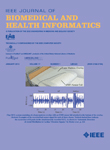
IEEE Journal of Biomedical and Health Informatics
Driving Innovation in Health Informatics and Patient CareIEEE Journal of Biomedical and Health Informatics is a premier publication dedicated to advancing the field of biomedical and health informatics. Published by the esteemed IEEE-Inst Electrical Electronics Engineers Inc, this journal boasts a notable impact within various disciplines, ranking in the top quartile (Q1) across key categories such as Biotechnology, Computer Science Applications, Electrical and Electronic Engineering, Health Informatics, and Health Information Management as of 2023. With a strong Scopus ranking—placing it at #11 in Health Informatics and #6 in Health Information Management—it serves as a vital resource for cutting-edge research and innovative practices. Open Access options enhance accessibility, fostering collaboration among researchers, professionals, and students. Since its inception in 2013, the journal has been committed to publishing high-quality, peer-reviewed articles that explore the pivotal intersection between technology and healthcare, thereby contributing significantly to the evolution of medical practices and patient care.
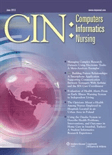
CIN-COMPUTERS INFORMATICS NURSING
Transforming Care Delivery with Informatics InsightsCIN-COMPUTERS INFORMATICS NURSING is a distinguished journal that publishes cutting-edge research at the intersection of nursing and information technology. Published by Lippincott Williams & Wilkins, the journal has been a pivotal platform since 2002, catering to the needs of health informatics professionals and nursing researchers. With an impressive impact factor and ranked within Q2 in Nursing (miscellaneous) and other relevant categories, it serves as a key resource for advancing knowledge and best practices in the field. The journal's inclusion in important databases ensures broad visibility and access to the latest findings that influence healthcare delivery. CIN-COMPUTERS INFORMATICS NURSING welcomes a diverse range of articles, including empirical studies, reviews, and innovative methodology approaches, making it an invaluable asset for clinicians, educators, and scholars dedicated to enhancing nursing informatics and improving patient outcomes.
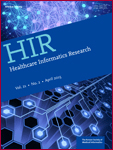
Healthcare Informatics Research
Pioneering the future of health informatics research.Healthcare Informatics Research, published by the Korean Society of Medical Informatics, is a leading open access journal that has been advancing the field of healthcare informatics since its inception in 2010. With an ISSN of 2093-3681 and E-ISSN of 2093-369X, the journal provides a vital platform for disseminating high-quality research aimed at improving healthcare systems through innovative informatics solutions. Recognized for its contributions, it holds a Q2 rank in Biomedical Engineering and Q3 rankings in both Health Informatics and Health Information Management for 2023, reflecting its stature within the academic community. The journal is committed to open access, ensuring that research is freely accessible to researchers, professionals, and students worldwide, thus promoting knowledge sharing and collaboration. Located in the dynamic city of Seoul, South Korea, the journal serves as a hub for groundbreaking studies that impact health systems globally, making it an essential resource for those at the forefront of healthcare technology and management.
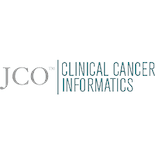
JCO Clinical Cancer Informatics
Driving breakthroughs in oncology through health informatics.Welcome to JCO Clinical Cancer Informatics, an esteemed journal at the forefront of the intersection between oncology and health informatics. Published by Lippincott Williams & Wilkins, this journal is dedicated to advancing the understanding and application of cancer data through innovative informatics solutions. Since its inception in 2017, JCO Clinical Cancer Informatics has established itself as a critical resource for researchers, practitioners, and students, as evidenced by its high rankings in the 2023 Scimago Quartiles—Q2 in Cancer Research and Q1 in both Health Informatics and Oncology. With a commitment to open access, this journal aims to disseminate groundbreaking research findings that enhance cancer care and inform public health strategies. Positioned in the United States, it serves as a pivotal platform for sharing knowledge and fostering collaboration within the global cancer research community.
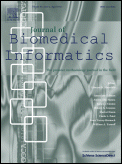
JOURNAL OF BIOMEDICAL INFORMATICS
Innovating the future of biomedical engineering.JOURNAL OF BIOMEDICAL INFORMATICS, published by Academic Press Inc. Elsevier Science, is a premier peer-reviewed journal dedicated to the integration of computer science and health informatics to advance the field of biomedical engineering and healthcare. With its ISSN 1532-0464 and E-ISSN 1532-0480, this influential journal has established itself with an impressive impact factor, reflecting its high-quality research contributions. Recognized within the top quartile (Q1) of both Computer Science Applications and Health Informatics for 2023, the journal ranks #135 out of 817 in Computer Science Applications and #25 out of 138 in Health Informatics according to Scopus metrics. Offering open access options, it fosters extensive dissemination and accessibility of groundbreaking research findings to the scientific community. As a scholarly platform from 2001 to 2024, it is engineered to cater to the educational needs of researchers, professionals, and students, promoting innovative studies that bridge the gap between technology and healthcare.
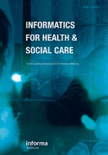
Informatics for Health & Social Care
Bridging gaps in health and social care through knowledge.Informatics for Health & Social Care is a leading journal published by Taylor & Francis Inc, dedicated to the intersection of health informatics and social care. With a strong emphasis on advancing knowledge in the fields of health information management and nursing, this journal has established itself as a vital resource for researchers and professionals seeking to explore innovative applications of informatics to improve patient outcomes and streamline healthcare delivery. Recognized for its influential contributions, it currently holds a Q2 ranking in both Health Informatics and Health Information Management, as well as a prestigious Q1 ranking in Nursing (miscellaneous) for 2023, signifying its critical role within the academic community. The journal is accessible for open access viewing, fostering a broader dissemination of research findings. Released continuously since 1976, it stands as a testament to the evolving landscape of health informatics, addressing pertinent issues and facilitating discussions that shape practices in health and social care delivery.

Biomedical Engineering-Biomedizinische Technik
Exploring the Intersection of Engineering and MedicineBiomedical Engineering-Biomedizinische Technik, published by WALTER DE GRUYTER GMBH, serves as a pivotal platform for advancing knowledge in the field of biomedical engineering and medicine since its inception in 1956. With an ISSN of 0013-5585 and an E-ISSN of 1862-278X, this peer-reviewed journal offers accessible insights into innovative research and technological advancements that are reshaping healthcare practices and biomedical applications. Although rated in the Q3 category for both Biomedical Engineering and Miscellaneous Medicine in 2023, the journal's impact factor and growing reputation demonstrate its vital role in fostering academic dialogue and collaboration. The journal is based in Germany, while its scope encompasses a diverse range of topics, thus bridging the gap between engineering and medical disciplines. Researchers, professionals, and students alike are encouraged to engage with the content that not only highlights contemporary challenges but also presents groundbreaking solutions in biomedical technology.

Lancet Digital Health
Transforming Health Systems with Cutting-Edge Research.Lancet Digital Health is an esteemed Open Access journal published by ELSEVIER, dedicated to advancing the interdisciplinary field of digital health. Since its inception in 2019, the journal has rapidly established itself as a leading platform for disseminating high-quality research focusing on the implications of digital technology in healthcare delivery, health informatics, and patient management. Renowned for its rigorous peer-review process and commitment to academic excellence, Lancet Digital Health currently holds prestigious Q1 rankings across multiple categories including Decision Sciences, Health Informatics, and Medicine (miscellaneous) as of 2023. With an impressive impact in its field—ranked #1 in Health Informatics and within the top percentile of related disciplines—this journal offers vital insights into the ongoing transformations within health systems globally. Researchers, healthcare professionals, and students alike will find a wealth of cutting-edge studies, practical applications, and discussions on the future of digital health, fostering an evidence-based dialogue that is essential in today's rapidly evolving medical landscape.